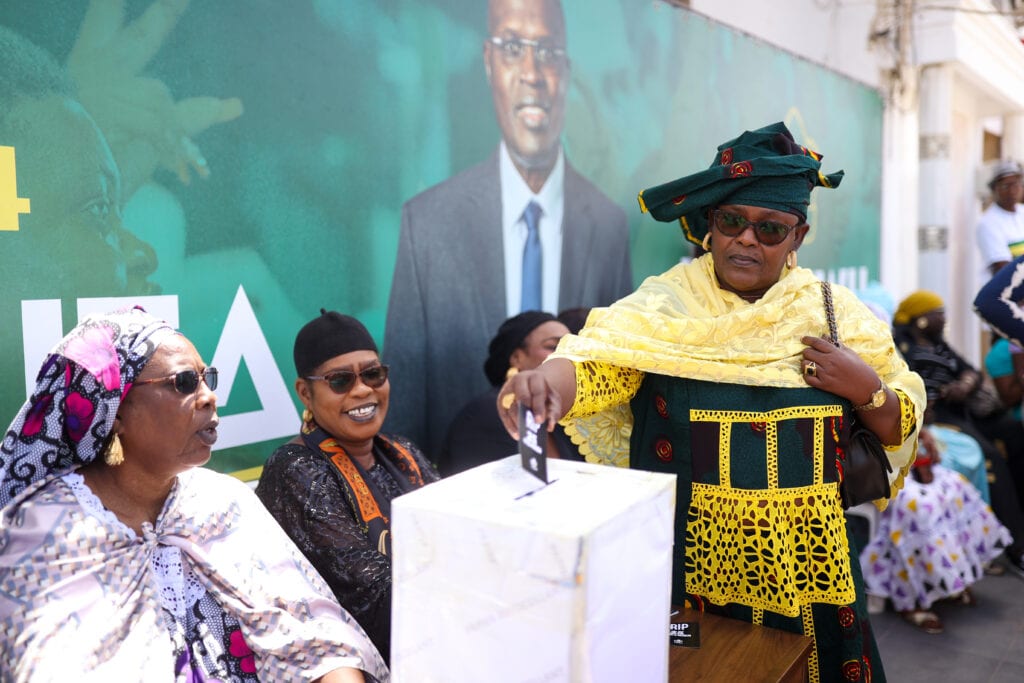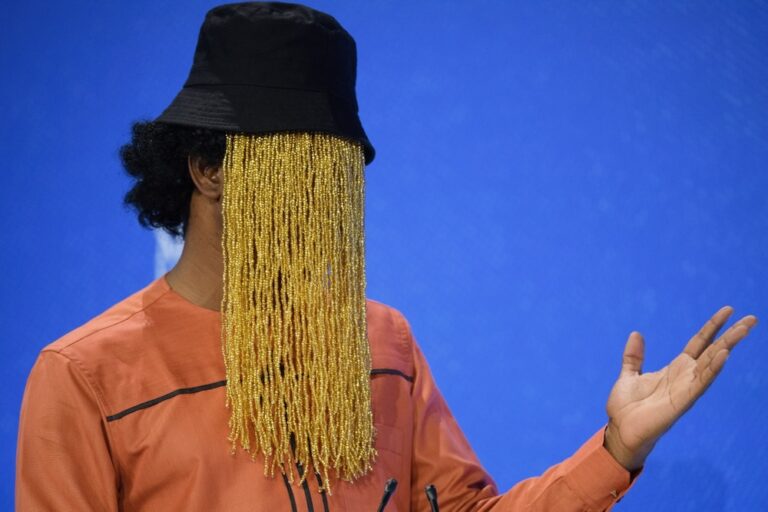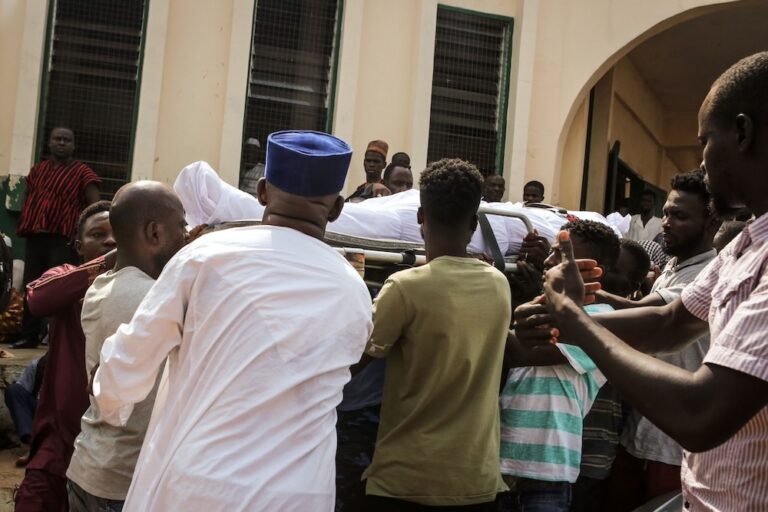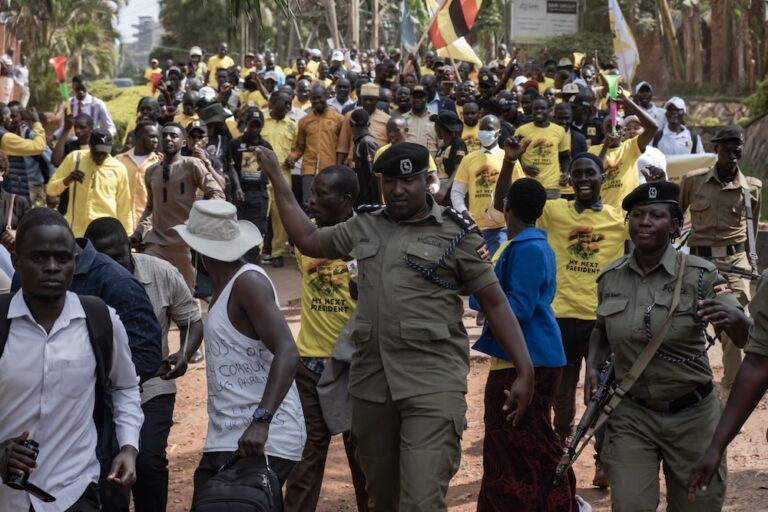January and February 2024 in Africa: A free expression round-up produced by IFEX's Regional Editor Reyhana Masters, based on IFEX member reports and news from the region.
The releases of French journalist Antoine Galindo in Ethiopia and Sékou Jamal Pendessa in Guinea were a welcome interruption in a news cycle of assaults and arrests of journalists on the continent. This brief also includes reports from the Democratic Republic of Congo, Kenya, Ghana, Malawi, Nigeria, and Senegal.
The loss of a Pan African stalwart
Condolence messages from around the globe began pouring in last month when Namibia’s vice president Nangolo Mbumba announced that President Hage Geingob had died at Lady Pohamba Hospital in Windhoek.
His unwavering commitment to media freedom stood out strongly in a continent where the press is constantly under attack.
His wife, former first lady Monica Geingos, paid tribute to his legacy of inclusivity: “The Internationalist. The pan African. The proud Namibian. The family man. The father to many. The joyful giver. […] Hage was dedicated to building an inclusive, united Namibia that lived up to its potential. He was raised as a Namibian and wanted to see the country’s integration of cultures, and the lack of tribalism he grew up in.”
Namibia Media Trust director Zoé Titus noted his “profound commitment to press freedom, a cornerstone of his legacy which has positively shaped the media landscape in Namibia.”
Pendessa arrested, then released; repression continues in Guinea
An exceptional show of solidarity in February was capped by the release of imprisoned Guinean journalist Sékou Jamal Pendessa following a successful appeal hearing that reduced his six-month partially suspended sentence to time previously served in detention.
Support for Pendessa, who is the secretary general of the Union of the Press Professionals of Guinea (SPPG), began with the country’s national trade union – Syndicat des travailleurs de la Guinea (STG) – requesting his unconditional release soon after he was arrested. It was part of a broader set of demands that included calls for lower food prices, an end to media censorship, and improved living conditions for civil servants. When, instead, Pendessa was convicted and handed a six month sentence, the STG, supported by a dozen trade unions and other stakeholders, instituted nationwide strikes that brought Conakry to a halt and slowed down the rest of the country.
Since the military takeover in September 2021 there has been steady and gradual decline of civic space in the country. Broadcasting channels have been suspended, access to news websites have been restricted, journalists have been intimidated, threatened and arbitrarily arrested and jailed. Access to popular social media sites, including Facebook, Instagram, WhatsApp and TikTok, has been blocked. The ruling junta rebuffed a call by the United Nations to lift a ban on political demonstrations in place since 2022.
Despite the ban, the SPPG has been leading the resistance against the “increased repression of media freedom,” as UN High Commissioner for Human Rights Volker Türk recently described it. This has put the the union and Pendassa in the firing line, and the most recent charges against him of “unlawful participation in public demonstration and attempt to public order”, were related to a rally organised to protest restrictions on press freedom and internet access in the country.
January brought an added dimension to Guinea’s volatile political and economic crisis when a video statement announced the dissolution of the transitional government by the military regime. “Although the junta did not explain why it dismissed the government on Monday, one of the key stated goals of Guinea’s military leaders has been rooting out corruption,” noted DW News.
Galindo arrested, detained, released, deported – Ethiopia’s cycle of harassment
Antoine Galindo, a French journalist working for Paris-based news website Africa Intelligence, travelled to Ethiopia to cover an African Union summit and work on local news stories. Despite receiving his accreditation and entering Ethiopia legally, he was arrested on 22 January, and there was no news of him until 24 February. He was released one day before his scheduled court appearance, and immediately deported.
Galindo was arrested while in conversation with Battee Urgessa, a representative of the Oromo Liberation Front (OLF) and they were both charged with “conspiracy to create chaos.” Voice of America reports that: “two days later, Galindo was brought before a judge who granted a one-week investigation period for police to search the journalist’s mobile phone and apprehend other ‘suspects’ who were ‘complicit.’”
Reporters without Borders (RSF) shared from a statement by Africa Intelligence that “condemned Galindo’s “unjustified arrest” and the “spurious accusations” against him, which it said were “not based on any tangible evidence that might justify this extended deprivation of liberty”, and called for an end to the mounting persecution of journalism in Ethiopia.
In their latest annual prison census, the Committee to Protect Journalists noted: “Ethiopia is the second-worst jailer of journalists in sub-Saharan Africa.”
Calls for Malawi to guarantee safety for Gregory Gondwe
Managing director of the privately owned news website Platform for Investigative Journalism, Gregory Godfrey Gondwe, who fled to South Africa in fear for his life, is keen to return home to Malawi and with the support of RSF is seeking guarantees for his safety.
An exposé by Gondwe published on 29 January reported that the Malawi Defence Force had made a large payment to a Malawi-born UK businessman suspected of corrupt practices. A few hours after it was published, a source warned Gondwe that he could be arrested at any moment because the authorities wanted to know where the leak came from, reported RSF.
Amnesty International and the Southern Africa Human Rights Defenders Network (Southern Defenders) say these actions expose the deterioration of media freedom in the country. Malawian authorities have a history of targeting journalists exposing corruption, and this is not Gondwe’s first encounter with threats. He was detained in 2022 for refusing to reveal his sources in another corruption investigation.
“The threats on Gondwe’s life have a chilling effect on journalists and the media fraternity. As a democracy, Malawi should not slide back to the era of heavy-handedness on media and critical voices.”
Senegal: The pushback continues
While Senegal’s tumble continues down the slippery slope of democratic deficit that IFEX reported on last month, one ray of light has been the strong pushback against the latest political crisis, which was sparked by President Macky Sall’s announcement that; “he had rescinded the decree convening the presidential election for February 25.” As Le Monde aptly describes: “Without ever uttering the word ‘postponement,’ he provoked a political earthquake. Not since 1963 has a presidential election been postponed in Senegal.”
The response to the bombshell declaration on 3 February was immediate, with simultaneous protests breaking out on the streets and outside parliament. Inside parliament, opposition legislators were expelled from a vote on the constitutional amendment that sought to delay the election date, thus allowing President Sall to extend his mandate and reset his term limit.
Opposition politicians and presidential candidates immediately stood up to what critics described as a constitutional coup d’état, by referring the matter to Senegal’s Constitutional Council (CC). The CC nullified the 3 February presidential decree and declared the 5 February amendment “contrary to the Constitution.”
As described by The Economist: “Stripped of a veneer of legality for his actions and under heavy pressure, [President] Macky Sall promised to fully implement the decision” of the council.” While he has promised to step down in April – when his term officially ends – President Sall has not yet set a date for elections.
Senegal’s National Dialogue Commission has proposed 2 June be set as a date for the polls along with the recommendation that President Sall be allowed to stay in office until his successor is sworn in. Unifying themselves under the name Fippu (“Resistence”), the civil society group Aar Sunu Election (Protect our Election), together with opposition candidates and other activists, not only refused to participate in the dialogue but also opposed the Commission’s proposals. Instead, the collective is pushing for the presidential election to be held before President Sall’s mandate runs out.
Journalists – who have been heavily impacted by the country’s political crisis – held a vigil on 12 February outside Press House in the capital Dakar, during which they expressed their condemnation of the violence that they are having to contend with.
Broadcasting stations have been taken off air and then reinstated, while numerous journalists exposing government corruption, scandals or reporting on opposition politician Ousmane Sonko’s ongoing trials, find themselves having to fend off a legal onslaught initiated by the state. Media reporting on the protestors are caught in the fray and assaulted. In January this year, Babacar Fall, the editor-in-chief of the radio station RFM, began receiving death threats for his critique of President’s Sall’s reign of governance.
In brief
In a landmark ruling, a Federal High Court has ordered Nigeria’s government to investigate attacks on reporters, prosecute perpetrators and ensure the safety of journalists. The judgement, which was delivered in a suit filed by Media Rights Agenda against the Federal Government, upheld the organisation’s claim “that by failing to guarantee the safety of journalists and other media practitioners in accordance with Principle 20 of the Declaration of Principles on Freedom of Expression and Access to Information in Africa, the Federal Government breached its statutory duty under the Declaration and the African Charter on Human and Peoples’ Rights (Ratification and Enforcement) Act (Cap A9), Laws of the Federation of Nigeria, 2004.”
Disappointed by the admission by Ghana’s attorney-general and minister of justice, Godfred Yeboah Dame, that his office has not yet received a docket on the murder of journalist Ahmed Suale, five years after his death, the Media Foundation for West Africa described the continued inaction as indicative of the government’s “flagrant indifference”. The MFWA is also urging authorities to sanction the officers who arbitrarily arrested and confiscated Nigerian journalist Kasarahchi Aniagolu’s equipment. Aniagolu, a reporter with Abuja based newspaper The Whistler, was arrested on 21 February while covering a police raid on Bureau de Change (BDC).
Prominent journalist Stanis Bujakera remains in detention in the Democratic Republic of Congo since 8 September 2023. He is charged with fabricating and distributing a two-page memo that formed the basis of an article published in Jeune Afrique, which Bujakera says he did not author. Appeals for his provisional release continue being rejected.
During the hearing of his appeal on 10 January, Rwandan journalist Dieudonné Niyonsenga – who also goes by Cyuma Hassan – described the inhumane conditions he is living under and the torture he is being subjected to. “He appeared in court with a head wound and said that his hearing and vision were impaired by the conditions of his detention, according to those sources,” reports CPJ.
New & Noteworthy
The Association of Media Women in Kenya (AMWIK) launched two reports focusing on the widespread issue of sexual harassment. The first report addresses the effectiveness of policies intended to end sexual harassment, and the second examines existing psychosocial and mental health support services available for survivors of sexual harassment in the Kenyan media, while identifying gaps and limitations in their effectiveness.



